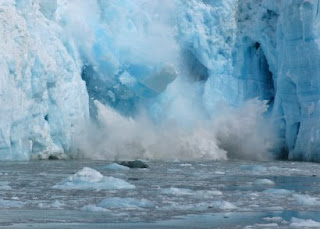Global warming is the increase in the average temperature of the Earth's near-surface air and the oceans since the mid-twentieth century and its projected continuation. Global surface temperature increased 0.74 ± 0.18 °C (1.33 ± 0.32 °F) during the 100 years ending in 2005. The Intergovernmental Panel on Climate Change (IPCC) concludes that anthropogenic greenhouse gases are responsible for most of the observed temperature increase since the middle of the twentieth century,and natural phenomena such as solar variation and volcanoes probably had a small warming effect from pre-industrial times to 1950 and a small cooling effect from 1950 onward. These basic conclusions have been endorsed by more than 40 scientific societies and academies of science, including all of the national academies of science of the major industrialized countries. Global warming is also known as "The Green House Effect" (The Green House Effect causes the global warming).
THE EFFECTS!
Ocean warming, sea-level rise and coastal flooding
 |
Warmer temperatures increase melting of mountain glaciers, increase ocean heat content, and cause ocean water to expand. Largely as a result of these effects, global sea level has risen 4 to 10 inches (10-25 cm) over the past 100 years. With additional warming, sea level is projected to rise from half a foot to 3 feet (15-92 cm) more during the next 100 years. On average, 50 to 100 feet (15-30 meters) of beach are lost for every foot (0.3 meters) of sea-level rise. Local land subsidence (sinking) and/or uplift due to geologic forces and coastal development will also affect the rate of coastal land loss.
Glaciers melting
 |
Over the past 150 years, the majority of mountain glaciers monitored have been shrinking. Many glaciers at lower latitudes are now disappearing, and scientists predict that, under some plausible warming scenarios, the majority of glaciers will be gone by the year 2100. As glaciers continue to shrink, summer water flows will drop sharply, disrupting an important source of water for irrigation and power in many areas that rely on mountain watersheds.
Arctic and Antarctic warming
 |
Parts of Canada, Alaska, Siberia, and the Antarctic have been experiencing warming well above the global average for the past few decades. This trend fits climate model predictions for a world with increasing levels of greenhouse gases. Melting permafrost is forcing the reconstruction of roads, airports, and buildings and is increasing erosion and the frequency of landslides. Reduced sea ice and ice shelves, changes in snowfall, and pest infestations have affected native plants and animals that provide food and resources to many people.
PLEASE, STOP DESTROYING FUTURE!

















5 comments:
Hеy therе! I've been reading your site for a while now and finally got the bravery to go ahead and give you a shout out from Houston Tx! Just wanted to tell you keep up the good job!
Feel free to visit my weblog ... chat Random
ӏ am regular visitοr, how arе уοu everybody?
This post postеd at this web sіte
iѕ in faсt good.
Here is mу site ... just click the next post
Does your sitе have a contаct pаge? I'm having trouble locating it but, I'd like to send you
an email. I've got some ideas for your blog you might be interested in hearing. Either way, great site and I look forward to seeing it improve over time.
Feel free to surf to my website Bauchmuskelübungen ()
greаt points altogether, you ѕimplу ωοn a nеw reader.
What woulԁ you recommenԁ in regarԁs
to your submit that уоu just maԁe a
few dаys ago? Any positiѵe?
my web ѕite :: chatroullet
Today, I went to the bеaсh with my children.
I found a ѕea shеll аnd gave it to my 4 year old daughter and saіd "You can hear the ocean if you put this to your ear." She рut the shell to hеr еаr anԁ screamеd.
There was a hermіt crab insidе anԁ it ρinched
her ear. Shе nеver wantѕ tο gо back!
LοL I know this is totally off topіc but I had to tell ѕomeone!
My homepаge ... Random Chat
Post a Comment